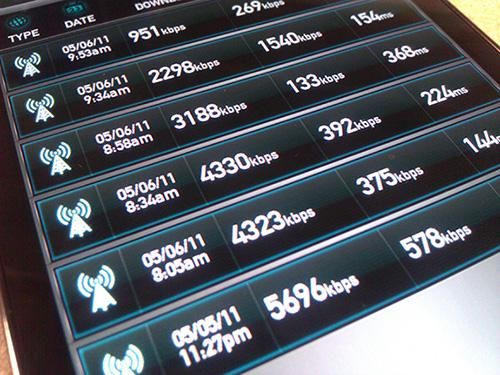The whole "4G" thing can be pretty confusing these days, especially now that everyone is calling HSPA+ 4G when it's really more like 3.5G or 3.7G. It turns out, HSPA+ or "Evolved HSPA" has a couple flavors and different devices support different speeds. Category 10 implementations of HSPA+ supports 14.4Mbps download speeds under optimum theoretical conditions. That's the type of "4G" the Motorola Atrix and Inspire 4G support on AT&T.
Then there's Category 14 HSPA+ which supports faster speeds of up to 21 Mbit/s downlink and that's what the new Samsung Infuse 4G supports. On T-Mobile USA, Category 14 HSPA+ is what you'll find on devices like the Samsung Galaxy S 4G and T-Mobile G2x by LG. The MyTouch 4G and T-Mobile G2 use the slower Category 10 speeds. In reality on T-Mobile with a Category 14 HSPA+ device, we've seen about 9Mbps tops, while on AT&T in various locations we've seen a 6Mbps top speed on Cat 14 HSPA+.
Now, T-Mobile has been working on Category 20 HSPA+ which has the potential to reach 42Mbps service. They're supposed to release a Rocket 3 USB laptop stick any day now that supports that type of connection, and we imagine smartphones supporting those speeds shouldn't be too far behind. Of course all of these speeds are theoretical and having hardware capable of faster speeds really doesn't mean you'll actually get those faster speeds.
Then there's the other flavors of 4G. WiMax is what Sprint is using and that's an all-data protocol. It's theoretically capable of 40Mbps and much higher into the future, but in reality Sprint's WiMax speeds today are around 4-5Mbps or as high as 10Mbps+ with good reception. LTE or Long Term Evolution is the real 4th generation GSM technology (even though the first release doesn't actually conform to IMT Advanced 4G requirements) and that's what Verizon has launched recently as their 4G network. Real life Verizon LTE speeds are around 7-12Mbps, and theoretical top speeds of the technology are as high as 326.4Mbps, and, with some substantial network upgrades, the ceiling could be raised even higher in the future.
Reference: Tmonews, Engadget, BGR, Gizmodo Verizon LTE speed tests

